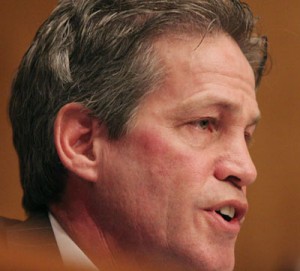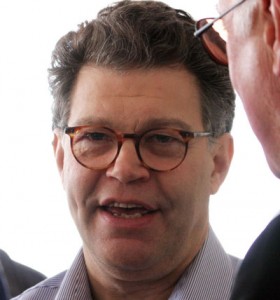Tight Minnesota Race Centers on Energy
Incumbent Sen. Norm Coleman (R) is bashing Democratic challenger, comedian Al Franken, for not supporting offshore drilling.
Jul 31, 2020137K Shares2.2M Views
Sen. Norm Coleman (R-Minn.) (WDCpix)
As Minnesota’s senatorial candidates head into the final months before November’s ever-tightening election, both appear increasingly eager to make the national energy debate central to the contest. What remains to be seen — both in Minnesota and around the country — is which contender will benefit most from that strategy.
Freshman incumbent Norm Coleman, a moderate Republican, is sponsoring TV ads calling for an expansion of offshore oil drilling and blasting his Democratic challenger, the former Saturday Night Live comedian Al Franken, for his reluctance to do the same. Franken, meanwhile, is painting Coleman as an oil industry minion — a guy who’s accepted hundreds of thousands of dollars from oil companies and in turn hopes to reward them with more drilling options.
The debate echoes that happening across the country, as towering fuel costs have catapulted energy concerns to the forefront of voters’ minds. With lawmakers in the middle of a five-week August vacation, leaders of both parties are jockeying to portray themselves as champions of efforts to ease prices at the pump and prevent heating bills from crushing family budgets in the coming winter.
For Republicans, that strategy includes lifting a decades-old moratorium on new offshore drilling. For Democrats, it means eliminating billions of dollars in federal oil company subsidies and shifting those funds to help jump-start a fledgling renewables industry. How the public ultimately judges the sides could determine elections all the way up to the contest for the White House.
Image has not been found. URL: http://www.washingtonindependent.com/wp-content/uploads/2008/08/politics.jpgIllustration by: Matt Mahurin
In Minnesota, each candidate is banking that the energy debate will play to his advantage. Indeed, when Franken accepted an endorsement last week from the League of Conservation Voters, an environmental group that opposes an increase in drilling, Coleman’s campaign pounced.
“Al Franken’s enthusiastic embrace of an endorsement from an organization that is working to block domestic offshore drilling in the Outer Continental Shelf reveals Al Franken’s true positions on energy,” blasted Cullen Sheehan, Coleman’s campaign manager.
Franken, meanwhile, says he’s not outright against more drilling in the oceans. (“I’m not categorically opposed to off-shore drilling if it’s environmentally sustainable,” Franken’s Web site states frankly.) But he’s quick to point out that such a plan offers no short-term relief for consumers. Indeed, the Bush administration’s Energy Information Admin. has found that lifting the offshore moratorium would have no significant impact on either domestic oil production or prices at the pump for the next 22 years.
“It’s a false solution,” Franken said in a brief interview Monday in Denver. “There’s just no immediate effect.”
If national polls were any indication, Franken would have a tough time convincing voters of that message. One recent survey put national support for new drilling near 70 percent. But regional attitudes could dull the effects of the drilling debate on November’s outcome.
Al Franken (WDCpix)
Minnesotans, living as they do alongside Lake Superior, know well the potential environmental perils of drilling underwater — and they’ve been historically opposed to the practice as a result. Indeed, Coleman was elected in 2002 on a platform that emphasized his opposition to drilling in the Arctic National Wildlife Refuge and the Great Lakes.
Michael Bailey, an election expert at Georgetown University, said that, nationally, Republicans may have found a winning issue in offshore drilling, but the message might not resound as loudly in Minnesota.
“[O]ffshore drilling is not a complete ‘freebie’ for Minnesotans,” Bailey wrote in an email, “even if there won’t be drilling in Lake Superior, there is grounds for Minnesotans to ‘get’ why people don’t like it.”
Lawrence R. Jacobs, director of the Center for the Study of Politics and Governance at the University of Minnesota, pointed to a recent state poll indicating that 62 percent of local voters support expanded offshore drilling, but roughly a quarter of them nonetheless support Franken over Coleman. “This suggests that the issue has some cross-over appeal,” Jacobs wrote in an email.
On Tuesday, Coleman added fuel to the debate, endorsing a bipartisan Senate compromise that would expand offshore drilling — popular among Republicans — while including $7.5 billion in federal funding to quicken the development of alternative fuel vehicles — popular among Democrats.
Franken, for his part, wants to ease prices at the pump by targeting alleged speculators and releasing 50 million barrels of oil from the approximately 700 million held in emergency reserves. Franken equates the drilling expansion to an industry giveaway even while oil companies are raking in record profits. His campaign hopes to link Coleman to a Republican Party with strong ties to big oil.
“He is very much a party-line guy on the energy crisis,” said Franken spokesman Andy Barr.
If campaign contributions are any indication, Franken has a case. Coleman has taken in $91,550 from the oil and gas industries this election cycle — ranking him 15th on the list of active senators — and $247,900 in his Senate career, according to the Center for Responsive Politics, a non-profit campaign-finance researcher. Franken, by contrast, has accepted $9,350 from the same industry.
Coleman’s campaign office did not respond to requests for comment.
Also distinguishing the candidates, Coleman supported the “gas-tax holiday” pushed earlier in the year by a number of lawmakers, including Sens. John McCain (Ariz.) and Hillary Rodham Clinton (N.Y.). Supporters said that temporarily eliminating the 18.4-cent federal gas tax would ease the financial pinch on summer vacationers — something many economists said would do more harm than good over the long-run.
Sure to excite the energy debate, House Speaker Nancy Pelosi (D-Calif.) joined other party leaders in Denver Tuesday to promote the Democratic energy package the chamber plans to take up in September. Pelosi, who had rejected the idea of expanded drilling as recently as last month, has indicated that the comprehensive proposal will lift some portions of the drilling moratorium. Environmentalists, however, are hoping that other provisions unpopular among Republicans will inspire enough opposition to sink the bill.
As some indication of the proposal’s chances, the Sierra Club last week began circulating a petition thanking Pelosi “for standing up to Big Oil.”

Rhyley Carney
Reviewer
Latest Articles
Popular Articles

